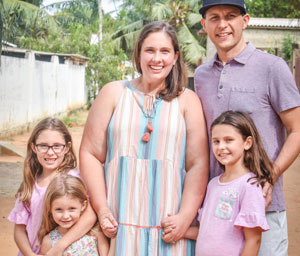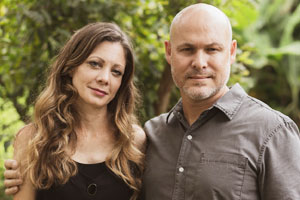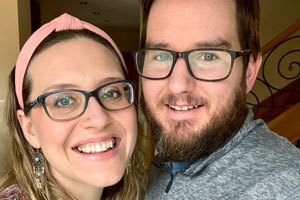“And I, if I am lifted up from the earth, will draw all peoples to myself” (Jn. 12:32, ASV).
With those words, Jesus let his disciples know they needed to broaden their worldview. His death and resurrection would usher in something radically new: a way to heaven for all ethnicities and people groups.
Converge is asking God for a gospel movement among every least-reached people group ― in our generation. We are committed to fulfilling the Great Commission to make disciples of all nations, with a message of forgiveness and transformation that transcends racial or cultural differences.
The Son of Man came “to seek and to save the lost.” In the same way, his committed followers continue to do the same, reaching out with a message of hope and redemption that speaks to all open hearts, no matter their location.
Here are four examples of how Converge is helping to share the gospel in diverse corners of the world. These ministries demonstrate that no matter where one goes, the god who is the same “yesterday, today and forever” is there.
JJ Alderman – reaching out to Togo/Benin, West Africa

In a country like Togo, where half the country is steeped in voodoo, there is a clear difference between voodoo’s fearful appeasement of often angry and capricious “gods” and a loving God, who never changes and desires a personal relationship, said JJ Alderman. He is the initiative leader of Converge’s 6º Initiative, a church planting movement focused on unreached people groups just north of the equator in West Africa.
Almost everyone in Togo believes in the reality of a spiritual world. But voodoo “saturates society,” and “nine out of 10 people have never heard a clear presentation of the gospel,” according to Alderman. However, that’s changing as more and more people see their lives transformed and share Jesus.
Since arriving in Togo in 2009. Alderman and his wife, Melissa, have seen the initial church they planted grow into two brick-and-mortar churches and 14 “micro” or home churches. In addition, four fledgling churches are about to be started.
“We’re praying 190,000 people from 10 unreached people groups will become disciples of Christ,” Alderman said. That figure would be the equivalent of 10% of the population meeting Jesus. Alderman expects to achieve that goal in his lifetime.
“That’s how fast things are progressing, and God is blessing.”
Related: “A major prayer movement is beginning across Converge”
Seventy percent of the people in Togo are under the age of 30. Alderman has seen God work powerfully among young people such as Koudjo. He took the gospel to the village of Gladjue and shared Jesus so effectively and enthusiastically that 112 people were saved in one weekend. And Koudjo now has two disciples who are making disciples.
“This village is being transformed by the gospel,” Alderman said. “Koudjo also has an opportunity to reach five other villages with the gospel.”
Israel, who is only 8 years old, is among the children who share their faith every week. “The teachers are working to be very intentional with leaders at every level of the church,” Alderman said. “These 10-year-olds could be planting micro churches in 10 years. So, our job is to help them get ready.”
“Some of these young leaders have been orphaned and lived tough lives with many bumps and bruises,” Alderman said. “But it has given them perspective. They’ve already demonstrated a willingness to take a stand and do what is right. They also see how God can use what they’ve gone through to help others.”
In Togo, sports and camps are often valuable vehicles for outreach. For example, Victor heard about Jesus on the basketball court, and his life transformed to such a degree that friends and neighbors recognized the clear contrast.
Related: From idol worship to gospel movement
“They’ll say, ‘We knew you before, but we see how you no longer sacrifice animals. You don’t cheat on your wife. We see how you treat your wife and children. What makes you different?’”
The dark and oppressive spiritual climate of voodoo makes the spiritual transformation of those who come to Christ even more obvious, opening doors to share the life-changing power of Jesus.
Jonathan Mathews – reaching out to Southern Brazil, Southern Argentina and Uruguay

Jonathan Mathews never expected to follow in his parents’ footsteps. His parents had been missionaries in South America but were killed in a car accident that the then 12-year-old Mathews and his siblings survived. From the ages of 12-18, he was raised by his uncle on an Ohio farm. During that time, Mathews wrestled with deep theological questions about why God allowed his parents to be killed and whether God was really in control.
That time of soul-searching and self-reflection “helped me learn to depend on God and trust things that I didn’t understand,” he said.
In college, Mathews went on a missions trip to Brazil to serve as a Portuguese translator and while there committed his life to serving the Lord. Once back in the U.S., he finished college and served in a church in Tennessee but began to feel God’s leading to go back to South America. He realized his background had uniquely equipped him with Portuguese fluency and a knowledge of the culture God could use to reach people in a largely unreached area of the world.
Mathews and his wife, Erin, and their family rented a building and started a church among the government housing projects of San Paolo, Brazil, that grew into several more churches. But eventually, the Mathews became “dissatisfied with the status quo.”
So, about three years ago, they decided to connect with Converge. That led to a move about a year and a half ago to a less-served, more rural area of Brazil where fewer than 4% of the people identify as evangelical.
Mathews, who serves as the Converge Southern Cone initiative leader, said that people might be surprised to learn that, even though it’s in South America, the area he serves isn’t typically Latin. About 88% of the people originally came from Italy, and there are also many Eastern Europeans or Germans. Hence, the culture is very European, and people tend to be devout, practicing Catholics or agnostic/atheists.
Related: Southern Cone Initiative (video)
“Most of the people have been here for a long time,” Mathews said. “It’s a close-knit, very family-oriented community. They tend to be very skeptical of outsiders, so it’s important to develop relationships.”
Mathews’ approach is to identify a few Christians in the community and develop their networks, especially by “engaging in acts of kindness and love.” The networks have developed to the point where about 160 pastors are involved at some level.
Engagement usually starts with participation in an instructional monthly Zoom call that provides free, curated content, followed by an invitation to join a cohort and finally an invitation to make a three-year commitment to plant a church.
Mathews says it’s a four-step gospel movement of proclamation, disciple multiplication, community engagement and church planting. Currently, three leaders are involved in the church planting process with an eye toward more multiplication.
Related: Missionaries making an impact
The COVID-19 pandemic has provided opportunities for churches in the community to serve neighborhoods affected by pandemic-related job losses. Churches have offered to pay peoples’ bills for a season and help them gain new employment.
One church group bought property and equipment, trained people and then opened an auto body shop to employ them. Now that the business is up and running, the church is handing it back to the employees to own and operate.
Churches also delivered food in the streets, conducted a blanket drive, delivered food and blankets to the homeless and, in some cases, found places for the homeless to live and work.
Opportunities are so abundant that “we can’t even say yes to them all,” Mathews said. “We’ve seen so many things happen, and it’s exciting, but we need more people on our team.”
Steve Valentine – reaching out to Poland, Czech Republic and Slovakia

Steve Valentine and his wife, Jenny, always felt called to international ministry. The pull to reach out to Poland grew out of a combination of personal familiarity with his grandmother’s Polish background, the complete dearth of people in Poland who identify as “born again” (0.2%) and opportunity.
There wasn’t a Damascus Road kind of experience for the Valentines, but a desire to meet a tremendous need and fulfill the Lord’s command to make disciples of all nations. As Valentine put it, Poland “captured our hearts.”
The country’s spiritual and cultural climate is changing rapidly, he said. Under communism, the Catholic church was a place of refuge where people could “still be Polish” and preserve traditions. However, since the Solidarity movement toppled communism in 1989, Catholic church attendance has dropped from about 80% to 30%. And, with openness to non-biblical ideologies and increasing secularism and materialism taking hold, it continues to fall.
Despite dwindling attendance, Catholic church buildings populate almost every corner. Evangelical churches rarely have buildings, needing either to rent out space or meet in homes. Valentine’s church plant in Poznan is one of only about 20 evangelical churches in a city of approximately 1.1 million people.
Valentine, who came to Poland about five years ago, launched a home church with six people. The church had grown to 20-25 adults and 18-20 children just before COVID-19 hit, locking things down. Despite pandemic-related restrictions, which are more stringent than in the U.S. (with the equivalent of $8,000 in fines for violating meeting restrictions), people are meeting in small, home gatherings ― “loving each other, supporting each other, reaching out to each other, bringing meals, praying and sharing the gospel,” he said.
Related: Life interrupted ― how is God shaping you?
In a way, the restrictions align with an intimate relational style that works well in Poland, a country where evangelicalism is considered a strange sect, arousing suspicion. But once people let you into their sphere, the Polish people are very warm and hospitable, often treating you like an extended family member.
“It wouldn’t work to pull people out of their networks and try to pull them into ours,” Valentine said. “It’s important to build trust within the context of their existing networks,” requiring personal outreach and creativity.
For example, Valentine said, a friend on Facebook asked about Bible studies. This led to a connection with a new believer who had been praying for God to provide her with a Bible-believing community. And this led to many connections with her extended network of friends and family, some of whom now gather for Bible study.
Despite COVID-19, a partner in another church had eight people express a desire to be baptized within six months. “That’s very unusual,” Valentine said. “Usually, it might be eight people who get baptized in a decade.”
People have also been meeting regularly for Zoom prayer meetings, “where we pray for specific people and pour out our hearts. We are asking God to perform miracles.”
Reaching out in a culture that mistrusts strangers and evangelicalism, combined with COVID-19 restrictions, can be challenging, Valentine said. “I don’t mean to imply that it’s so much more difficult here than elsewhere, but it’s always a spiritual battle.”
Being a foreigner has some advantages because it arouses curiosity and provides opportunities for conversations and making connections through outreaches such as English classes.
In the end, the responsiveness the Valentines have seen offers evidence that, even in a difficult environment, the light of the gospel breaks through.
Cirilo Doguiles – reaching out to the Philippines

Cirilo Doguiles and his wife, Dory, are native Filipinos who spent 29 years in the United States before returning to the Philippines. During his time in the U.S., he served as Converge executive director of International Ministries. The couple moved back to the Philippines in 2014, when they finished what he somewhat ironically calls their “tour of duty” in the U.S.
The Philippines had undergone many changes in the almost three decades they had been away. One significant difference is there were only about 500 churches total when they left. But by the time they returned, there had been an explosion of churches. These included U.S.-style megachurches, traditional and charismatic Catholic churches and the houses of worship of three major cults.
Catholicism is the dominant faith, with about 80% of the people identifying as Catholic. About 12% identify as evangelical and 6% as Muslim.
“Filipinos are generally very religious, and there is an openness to the gospel,” Doguiles said. “I’ve been able to share the gospel many times, in taxis or just as I go about my business.” Compared to the U.S., he says it’s easier to start a conversation about spiritual things.
Revolutions and political instability have occurred in the Philippines, but that uncertainty has made people more open because “they’re searching for answers,” he said.
Related: Converge International Ministries Asia region
Doguiles describes Filipino culture as very relational and less structured than in the U.S., making it challenging to adhere to systematic programs and goal setting. He focuses on training leaders, both through informal work with the Filipino Council of Evangelical Churches and more formally through teaching at the Cebu Graduate School of Theology. Doguiles provides training for discipleship and leadership development through education and mentoring, helping pastors in the Mindanao, Masbate and Leyte districts set and achieve strategic goals.
In the Mindanao district, he started coaching district leaders six years ago, intending to plant five new churches. At the time, they had 15 churches. Now, they have 34, far outdistancing their goal.
Forty churches have been planted in the Masbate district.
Doguiles has also started mentoring leaders in the Leyte district, which has nine churches and six outreaches.
Converge has been working in the Philippines for more than 60 years, and “more than 450 churches are the product of our ministry,” Doguiles said. “We’ve seen unprecedented growth in the past three decades, but there are still challenges, especially financial challenges and a need for training. We’re strong in terms of movement, but there is a need for formal theological training and church strengthening.”
These dedicated missionary pastors and workers are serious about obeying Jesus’ command to preach the gospel to all people. The book of Revelation gives us a glimpse of the fruit of their efforts.
“After these things I looked, and behold, a great multitude which no one could number, of all nations, tribes, peoples, and tongues, standing before the throne and before the Lamb, clothed with white robes, with palm branches in their hands, and crying out with a loud voice, saying, “Salvation belongs to our God who sits on the throne, and to the Lamb!” (Rev. 7:9-10, NKJV).
Converge International Ministries is on the front lines of global church planting and ministry. Find out how you can join us as a global worker and help reach the world’s least-reached peoples with the life-changing gospel of Jesus Christ.
